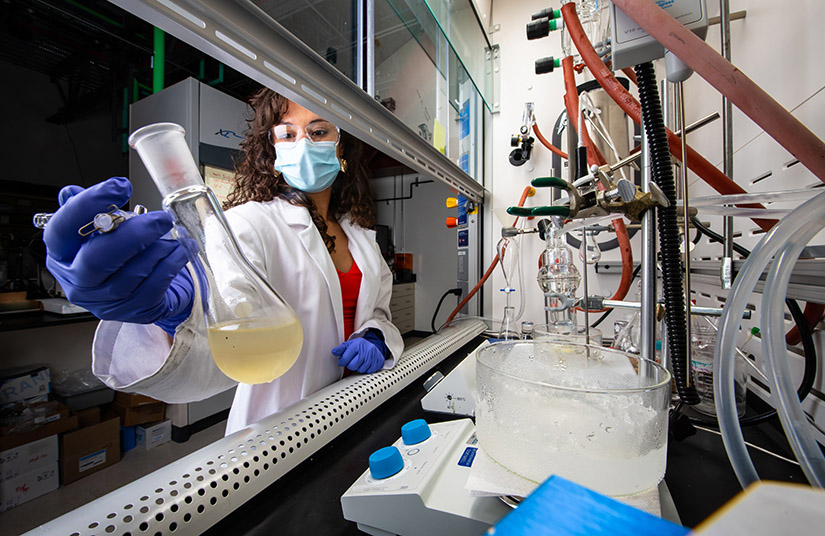BOTTLE Consortium Launches To Change the Way We Recycle
Department of Energy Puts NREL in Charge of Collaborative Effort To Address Plastic Pollution

The National Renewable Energy Laboratory (NREL) will lead a collaborative effort funded by the U.S. Department of Energy (DOE) to tackle the growing global crisis of waste plastics.
Supported by the Bioenergy Technologies Office and the Advanced Manufacturing Office, both within DOE’s Office of Energy Efficiency and Renewable Energy (EERE), this new effort currently includes four additional partner DOE research laboratories and four universities. The partnership has been dubbed the BOTTLE Consortium for “Bio-Optimized Technologies to keep Thermoplastics out of Landfills and the Environment.”
The consortium will focus on two critical problems that are both essential to tackle the plastics pollution problem. The first challenge is how to upcycle today’s waste plastics in a way that incentivizes their reclamation. The second undertakes the challenge of wholly redesigning tomorrow’s plastics to be recyclable-by-design.
The creation of the BOTTLE Consortium comes amid growing concerns about plastic pollution in the environment, and especially in the world’s oceans. Moreover, as of 2018, only 16% of plastics were recycled.
Gregg Beckham, a senior research fellow at NREL, will lead the BOTTLE Consortium.
“Plastic pollution is being found essentially everywhere researchers are looking for it,” Beckham said. “Besides accumulating in landfills and creating garbage patches in our oceans, recent work shows that microplastic particles are accumulating in our wilderness areas at an alarming rate—more than 1,000 metric tons per year are falling via wind and rain in remote areas of the Western United States. The consortium’s biggest advantage is the passion each partner has in working together for the common goal of solving one of the world’s biggest environmental problems.”
The BOTTLE team will work together to develop new, selective, and scalable technologies to deconstruct today’s plastic goods using a combination of chemical and biological processes. The deconstructed raw material can then be upcycled into higher-value materials or used to create new plastic goods that are designed for recycling.
BOTTLE brings together a highly collaborative and interdisciplinary team of experts at world-class institutions. In addition to NREL, key participants in BOTTLE are Argonne National Laboratory, Los Alamos National Laboratory, Oak Ridge National Laboratory, SLAC National Accelerator Laboratory, Colorado State University, Massachusetts Institute of Technology, Montana State University, and Northwestern University. BOTTLE will also closely collaborate with the Centre for Enzyme Innovation at the University of Portsmouth in the UK.
“We are thrilled that NREL is leading this effort for EERE in collaboration with multiple other prominent research institutions,” said Adam Bratis, NREL’s associate laboratory director for Bioenergy Science and Technology.
BOTTLE researchers have already made important contributions toward addressing the plastics problem. For example, NREL and partners have improved a natural enzyme to more rapidly digest polyethylene terephthalate (PET) bottles. Newly published work provided further insight into the plastic-degrading enzyme: When paired with a second enzyme, the two work in tandem to break down PET six times faster. In addition, a new approach for upcycling has been previously reported that involves combining low-value, waste PET with plant-based compounds to produce high-value fiber-reinforced plastics that can be used in products from snowboards to wind turbine blades.
BOTTLE is an important component of the Department of Energy’s Plastics Innovation Challenge, designed to accelerate innovations in energy-efficient plastics recycling technologies by 2030.
“Although plastics are essential to modern life, plastic waste can currently subsist for centuries in the biosphere,” Beckham said. “Urgent action on a global scale will be required to stem the rising tide of plastics that enter landfills and the natural world. Overcoming these challenges are at the core of BOTTLE’s mission.”
NREL is the U.S. Department of Energy's primary national laboratory for renewable energy and energy efficiency research and development. NREL is operated for the Energy Department by the Alliance for Sustainable Energy, LLC.
Last Updated May 28, 2025
